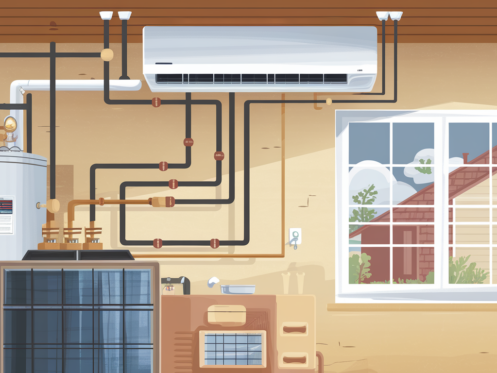Maintaining your water heater is important for keeping a steady supply of hot water in your home. One common issue that homeowners face is a water heater leak. These leaks may cause poor heating, higher bills, and even water damage if not addressed promptly. This article focuses on helping you identify and fix water heater leaks properly, keeping your home cozy and safe.
Common Causes of Water Heater Leak
Knowing the usual causes of water heater leaks can help you prevent them and act fast if a leak happens. Here are some common reasons your water heater might leak:
- Corrosion: Over time, the metal components of your water heater can corrode, leading to leaks. This is especially common in older units.
- Loose Connections: The connections and fittings of your water heater can become loose, allowing water to escape. Regularly checking and tightening these connections can prevent leaks.
- Temperature/Pressure Relief Valve Issues: This valve is designed to release water if the pressure or temperature gets too high. If it’s faulty, it might leak water continuously.
Regular maintenance is key to preventing these issues. By scheduling routine inspections and addressing minor problems early, you can extend the life of your water heater and avoid costly repairs.
Identifying Hot Water Heater Leaking Problems
Finding a leak in your water heater early can help avoid expensive repairs and damage. Here’s a simple guide to find any problems:
- Visual Inspection: Start by examining the area around your water heater. Look for any signs of moisture or puddles on the floor, which can indicate a leak.
- Check the Connections: Inspect all the connections, including the inlet and outlet pipes. Ensure they are tight and free from corrosion.
- Listen for Unusual Noises: Strange sounds, such as hissing or popping, may suggest a problem inside the tank.
- Inspect the Pressure Relief Valve: This valve is a common source of leaks. Check if it’s dripping or has any signs of corrosion.
- Examine the Tank: Look for rust or corrosion on the tank itself, as these are indicators of potential leaks.
Regular checks can help you catch leaks early and prevent further damage to your home.
What to Do If Your Hot Water Tank is Leaking
If you discover a leak in your hot water tank, it’s important to act quickly to minimize damage. Here are some practical steps you can take:
- Turn Off the Water Supply: Locate the water shut-off valve and turn it off to stop the water flow to the heater.
- Power Down the Heater: For electric heaters, switch off the power at the circuit breaker. For gas heaters, turn the gas valve to the ‘off’ position.
- Drain the Tank: If the leak is significant, consider draining the tank by attaching a hose to the drain valve and directing the water to a safe location.
- Seek Professional Help: While some minor leaks can be fixed with DIY solutions, it’s always best to contact a professional. They can accurately diagnose and repair the issue, ensuring your water heater functions safely and efficiently.
Addressing leaks promptly not only protects your home but also extends the life of your water heater. For expert assistance, consider reaching out to Quality Cooling & Heating for reliable and professional service. You can also explore our services in different locations such as Georgetown, TX and Abilene, TX.
Ensuring Long-Term Water Heater Health
Preventing future leaks and ensuring the longevity of your water heater requires regular maintenance and attention. Here are some comprehensive tips to keep your water heater in top condition:
- Regular Inspections: Schedule regular inspections with a professional to catch potential issues early.
- Timely Repairs: Address any minor issues immediately to prevent them from escalating into larger problems.
- Temperature and Pressure Relief Valve: Ensure this valve is functioning correctly to prevent pressure build-up, which can cause leaks.
- Flush the Tank: Regularly flushing your water heater tank helps remove sediment build-up, which can lead to corrosion and leaks.
- Annual Maintenance: Flush your water heater annually to remove sediment buildup, which can cause leaks and reduce efficiency.
- Check the Anode Rod: This rod helps prevent rust inside the tank. Replace it if it’s worn down.
For a comprehensive guide on preventing water heater leaks, check out Althoff Industries Inc.’s tips.
At Quality Cooling & Heating, we offer reliable plumbing services and regular maintenance plans to help you keep your water heater and other home systems running smoothly. Visit our homepage to learn more about our services and how we can assist you in maintaining a comfortable and safe home environment.
Energy-Efficient Water Heater Options
Choosing an energy-efficient water heater not only saves on energy costs but can also reduce the likelihood of leaks. Modern water heaters are designed to be more reliable and durable. Here’s how you can benefit from selecting an energy-efficient model:
- Reduced Wear and Tear: Energy-efficient heaters often have advanced features that minimize stress on the system, reducing the chance of leaks.
- Longer Lifespan: These models are built to last longer, meaning fewer replacements and repairs over time.
- Cost Savings: Lower energy consumption translates to savings on your utility bills, making them a smart investment.
To explore energy-efficient options, check out Selecting a New Water Heater | Department of Energy.
When to Replace a Leaky Hot Water Heater
Knowing when to replace a water heater can save you time, money, and the hassle of frequent repairs. A leaky hot water heater often signals that it might be time for a replacement. Here are some signs to look out for:
- Age of the Heater: Most water heaters last between 8 to 12 years. If yours is within this range or older, it might be time to consider a new one.
- Frequent Repairs: If you’re constantly fixing leaks or other issues, investing in a new unit could be more cost-effective.
- Rusty Water: Rusty water from your taps can indicate that the inside of your tank is rusting, which often leads to leaks.
- Noisy Operation: Loud noises like rumbling or popping can indicate sediment buildup, which can cause leaks and reduce efficiency.
For more detailed information on when to replace your water heater, visit The Home Depot’s guide on water heater replacement.


